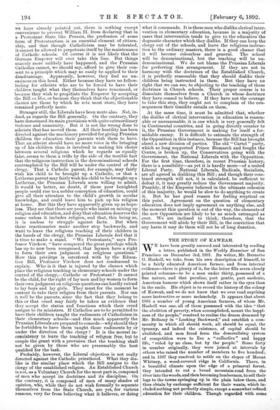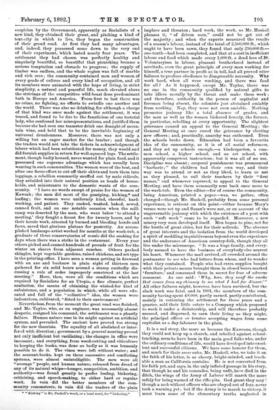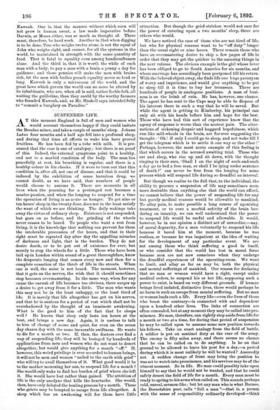THE STORY OF ICAWEATI.
WE have been greatly amused and interested by reading a letter, published in the Weekly Examiner of San Francisco on December 3rd, 1891. Its writer, Mr. Barnette G. Haskell, we take, from his own description of himself, to be a fairly educated American farmer, and from internal evidence—there is plenty of it, for the letter fills seven closely printed columns--to be a man under thirty, possessed of a fine nature, and that peculiar, part gentle, part sardonic, American humour which shows itself rather in the eyes than in the smile. His object is to record the history of the colony of Kaweah, and we do not know that we ever read anything more instructive or more melancholy. It appears that about 1885 a number of young American farmers, of whom Mr. Haskell was one, all of them possessed with the idea " that the abolition of poverty, when accomplished, meant the happi- ness of the people," resolved to realise the dream dreamed by Mr. Bellamy in "Looking Backward," and establish a com- munity in which all should work, all should be equal, the tyranny, and indeed the existence, of capital should be abolished, and men freed from the demoralising system of competition were to live a "collective" and happy life, "ruled .by no class, but by the people." Some forty in number originally, they were joined at intervals by others who raised the number of members to five hundred; and in 1887 they resolved to settle on the slopes of Mount Whitney, a wood-covered ridge in California. There, in a beautiful climate upon the edge of a primeval forest, they intended to cut a broad mountain-road from the river into the woods, and then becoming lumbermen, to sell their logs to the towns springing up in the plain below them, and thus obtain by exchange sufficient for their wants, which in- eluded nothing not perfectly simple, except a somewhat refined education for their children. Though regarded with some
suspicion by the Government, apparently as Socialists of a new kind, they obtained their grant, and pitching a kind of tent-city in which to live, they began the construction of their grand road. At first they had many advantages, and, indeed, they possessed some down to the very end of their experiment, 'which lasted nearly four years. • The settlement they had chosen was perfectly healthy and singularly beautiful, so beautiful that picnicking became a serious temptation and obstacle to progress ; the supply of timber was endless, and- the whole region was full of marble and rich ores ; the community contained men and women of every grade of culture and every kind of occupation, and all its members were animated -with the hope of living, in strict simplicity, a •natural and peaceful life, much elevated above the strivings of the competitive wild-beast dens predominant both in Europe and America. From first to last there was no crime, no fighting, no efforts to swindle one another and the world. There was also no drinking, for although a charge of that kind was once made against the settlement, it was traced, and found to be due to the fanaticism of one teetotal lady, who confessed her misrepresentations, and justified them because she had seen one teamster drink one draught of moun- tain wine, and held that to be the inevitable beginning of universal drunkenness. Moreover, there was not only a willing but an eager market for the lumber ; and though the traders would not take the tickets in acknowledgment of labour •which had been substituted for money, they would and did furnish supplies in-return for well-squared logs. The settle- ment, though badly housed, never wanted for plain food, and it possessed one supreme advantage which has usually been wanting in such communities. The women were of the best, and after one fierce effort to cut off their skirts and turn them into leggings, a rebellion summarily snuffed out by male ridicule, they subsided into their natural position as heads of house- holds, and ministrants to the domestic wants of the com- munity. " I have no words except of praise for the women of Kaweah ; the men did most of the gossiping, kicking,* and loafing ; the women were uniformly kind, cheerful, hard- working, and patient. They cooked, washed, baked, sewed, canned fruit, and on one notable occasion when the mill- camp was deserted by' the men, who went below to attend a meeting,' they fought a forest fire for twenty hours, and by their heroic work. attested by burned and bleeding hands and faces, saved that glorious plateau for posterity. An accom- plished landscape-artist worked for months at the wash-tab, a graduate of three conservatories of music did the cooking for days when there was a strike in the restaurant. Every year others picked and canned hundreds of pounds of fruit for the winter 'on shares from adjacent ranches. Others 'packed shingles, kept vegetable gardens, raised chickens, and set type in the printing-office. I have seen a woman getting in firewood with an axe and bucksaw in plain sight of thirteen men gathered for six solid hours around a stamp excitedly dis- cussing a rule of order improperly ,constraed at the last meeting." Here, then, were all the conditions which are required by Socialists for an Utopia, a fine climate, perfect sanitation, the means of obtaining the wished-for kind of subsistence, and a population in which, while all were edu- cated and full of the "collective" idea, the women were industrious, cultivated, "fitted to their environment."
Nevertheless, from the moment the great road was finished, and Mr. Taylor, who, as an engineer, was necessarily almost despotic, resigned his command, the settlement was a ghastly failure. Human nature rose in its might against an artificial system, and prevailed. The ancient laws proved too strong for the new theorists. The equality of all abolished or inter. fend with direction ; government by a general meeting proved not only inefficient but vacillating; the changes in office were incessant ; and everything, from wood-cutting and viticulture to keeping the books, was done as badly as it was humanly possible to do it. The vines were left without water; and the account-books, kept on three successive and conflicting systems, were almost unintelligible. The men were all " average " people, and human nature, released from dread of any of its natural whips—hunger, competition, ambition, and authority—was found greatly to prefer loafing, bickering, criticising, and speech-making, to either hard or regular work. In vain did the better members of the com- munity remonstrate, in vain did the traders of the plain
• " Kicking" is Mr. Haskell's word, or a local word, for "bickering."
implore and threaten ; hard work, the work, as Mr. Haskell phrases it, " of driven men," could not be got out , of the majority ; and when the experts measured the results of a season's labour, instead of the total of 2,500,000 ft., which ought to have been sawn, they found that only 250,000 ft.— one-tenth—had been completed, and that at a cost in inefficient labour and food which made every 1,000 ft. a dead loss of,18. Voluntaryism in labour, pleasant brotherhood instead r of
servitude, even the great principle of every man working for himself, a tree partner in profit as in toil, had all proved utter failures to produce obedience to disagreeable necessity. Why work hard, when all were working, and there was food for all ? As it happened, except Mr. Taylor, there was no one in the community qualified by natural gifts to take idlers morally by the throat and make them work ; and therefore, authority in the person of capitalist and foreman being absent, the colonists just abstained amiably from working. Nay, they were not even amiable. Nothing promotes jealousy like a total absence of grades, and the men as well as the women bickered fiercely, the former, in particular, rebelling at every opportunity. The slightest
grievance caused an appeal to the General Meeting ; the General 'Meeting at once cared the grievance by electing
new officers ; and, practically, anarchy was enthroned. Even the schools broke down. Education had been a favourite idea of the community, as it is of all social reformers, and they set up schools enough,—a kindergarten, a com- mon school, a higher school, and an art school, with apparently competent instructors ; but it was all of no use. Discipline was absent ; corporal punishment was pronounced " barbaric ; " the children had their own way, and their way was to attend or not as they liked, to learn or not as they pleased, to call their teachers by their " first names," and whenever reproved, to appeal to the General 'Meeting. and have them summarily sent back once more to the wash-tub. Even the editor—for of course the community, being American, printed a paper—was, we gather, often changed—though 'Mr. Haskell, probably from some personal experience, is reticent on this point—either because 'Mary's verses were set up and Susan's were not, or on account of • the ungovernable jealousy with which the existence of a post-with such " soft work " came to be regarded. Moreover, a new misery very soon developed itself. Men began to pine, not for the bustle of great cities, but for their solitude. The absence of great interests and the isolation from the world developed a spirit of meddling inquisitiveness beyond even the experience and the endurance of American country-folk, though they all live under the microscope. " It was a huge family, and every- body seemed to have the business of everybody else nearest his heart. Whenever the mail arrived, all crowded around the postmaster to see who had letters from whom, and to wonder what they contained. People who had extra supplies bought with their private means brought them in closed boxes marked ' furniture,' and consumed them in secret for fear of adverse comment. As one said : Why, here, they snuff the smoke that comes from -my chimney to see what I had for dinner." All other failures might, however, have been survived, but- the slack work was fatal, and in 1891, the members of the com- munity having spent £8,000, partly earned, partly contributed, mainly in rationing the settlement for -three years and a quarter, sold their little estate to a Company which proposed to work it under a dictatorship, and will therefore probably succeed, and dispersed, to earn their living as they might, the principal officer or trustee accepting wages from some capitalist as a day-labourer in the plain.
It is a sad story, the more so because the Kaweans, though they could not keep up a church, and rebelled against school. teaching, seem to have been in the main good folks who, under the ordinary conditions of life, would have developed into excel- lent and successful citizens. We have some honour for them, and mach for their sacer vales, Mr. Haskell, who, we take it on the faith of his letter, is as cheery, bright-minded, and teach- able a man as California contains. He is not converted from his faith yet, and says, in the only inflated passage in his story, that though he and his comrades, being unfit, have died in the ditch, the wings of the Army of Labour will march the more safely for being warned of the rifle-pits. God grant they may ! though a mob without officers who are obeyed out of fear, never took a warning yet ; but if the Army is to march to victory, it must learn some of the elementary truths neglected in
Kaweah. One is, that the manure without which corn will not grow is human sweat, a law made imperative before Darwin, or Moses either, was so much as thought of. There must, therefore, be bard work. Another is, that when digging is to be done, Tom who weighs twelve stone, is not the equal of John who weighs eight, and cannot, for all the systems in the world, be maintained in strength with the same quantity of food. That is fatal to equality even among handicraftsmen alone. And the third is, that it is worth the while of each man with a body, to pay a man with a brain a penny a day for guidance; and those pennies will make the men with brains rich, let the men with bodies preach equality never so loud or long. Kaweah is only a microcosm of the world, and the great laws which govern the world can no more be altered by its inhabitants, who are, when all is said, rather feeble folk, all waiting the guillotine, than they could by the worthy farmers who founded Kaweah, and, as Mr. Haskell says, intended fully to "commit a burglary on Paradise."








































 Previous page
Previous page